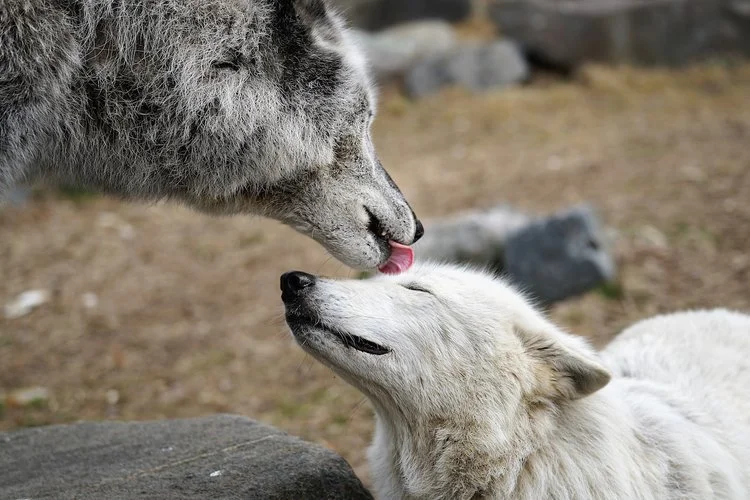Conservation groups demand the release of endangered Mexican gray wolf pack
The Mexican gray wolf and her pups were set to be released in June, but conservationists fear that political influence is behind the unexplained delay, following objections from the livestock industry.
Credit: Wolf Conservation Center
Conservation groups have come together to support the immediate release of an 'iconic' Mexican gray wolf and her pups.
The Caldera Pack was due to be released in New Mexico in June, but conservationists fear that political influence is behind the unexplained delay, after objections from the livestock industry.
Now, thirty-six conservation groups have signed a letter to the U.S. Department of the Interior and the U.S. Fish and Wildlife Service.
"Implementation of the Endangered Species Act is required by the statute to be based exclusively on the best science, not political influence", reads the letter. "Time is of the essence. Now is the opportunity to accustom the Caldera Pack to their natural prey of elk, which Mexican wolves typically learn to hunt during the early summer when elk calves abound."
The pack consists of Asha, her mate, Arcadia, and their five pups. Asha was born in the wild, and became an "icon of wolf wandering" after making unprecedented movements beyond the Fish and Wildlife's arbitrary boundary for Mexican gray wolves, Interstate 40.
Credit: Wolf Conservation Center
Following her release, Asha was captured again, in December 2023, after making a second movement into northern New Mexico. Asha has since been held in a facility in Socorro. The U.S. Fish and Wildlife Service stated in July 2024 that she would be released if pups were born.
This announcement sparked widespread condemnation from conservation groups. “Making Asha’s freedom dependent on her ability to breed represents an outdated and unscientific philosophy held by wildlife managers that needs to change”, said Cyndi Tuell, Western Watersheds Project’s Arizona and New Mexico director.
“Asha’s value to her species isn’t solely as a breeder — she’s an experienced wild wolf with important knowledge and traditions to share with other wolves”, explained Regan Downey, director of education of the Wolf Conservation Center. “Depriving her of the wild is also depriving wild lobos of her keen instincts and is yet another setback on the path to true recovery.”
That Asha made repeated attempts to cross Interstate 40 also highlights the problem of marking boundaries. “This wolf, and others like her, are showing us where the wolves want to be. The human-created maps, with imaginary lines on the ground where wolves are not allowed, ignores what science tells us — that the southern Rocky Mountains are home to the Mexican gray wolf”, said Cyndi Tuell, Western Watersheds Project’s Arizona and New Mexico director. “Making Asha’s freedom dependent on her ability to breed represents an outdated and unscientific philosophy held by wildlife managers that needs to change.”
After "the government’s deliberate campaign of wolf extermination on behalf of the livestock industry", the number of Mexican gray wolves dropped to as low as seven, in 1980. Their reintroduction in 1998 has led to a recovery and, according to the letter, a multitude of public polls over decades show that "large majorities of New Mexico and Arizona residents in both urban and rural areas support recovery of the Mexican wolf".
Learn more: Maggie Howell is the former executive director of the Wolf Conservation Center, an organization that is working to protect and preserve wolves in North America. And they do it through science-based education and advocacy, and they participate in the federal recovery and release program for two critically endangered wolf species, the Mexican gray wolf and the red wolf. Listen to the Species Unite podcast episode with Maggie here.
Help change the narrative for wolves: We want to encourage 100,000 students to use their voices for wolves and send letters to the Department of the Interior requesting that wolves be relisted as endangered and given the protections they need. Learn more about our Wolves in Schools program and share with the educators you know.
We Have A Favor To Ask…
Species Unite amplifies well-researched solutions to some of the most abusive animal industries operating today.
At this crucial moment, with worldwide momentum for change building, it’s vital we share these animal-free solutions with the world - and we need your help.
We’re a nonprofit, and so to keep sharing these solutions, we’re relying on you - with your support, we can continue our essential work in growing a powerful community of animal advocates this year.





The 25% death rate is prompting renewed criticism of zoo breeding programs and fresh calls to prioritize sanctuary-based alternatives.